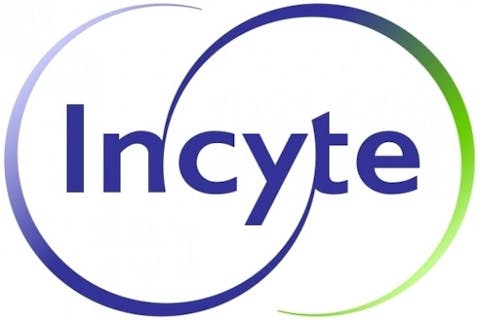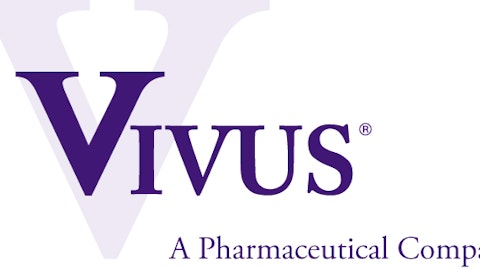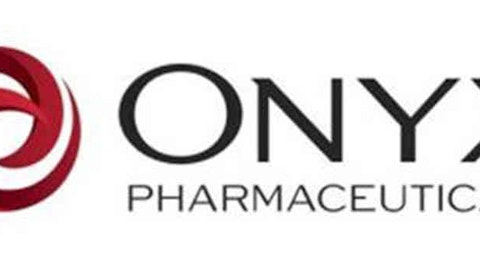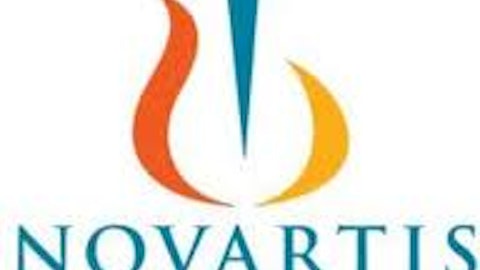Incyte Corporation (NASDAQ:INCY) today announced positive results from a phase 2 study of its drug Jakafi in treating refractory metastatic pancreatic cancer. Shares were up around 28% in early trading. Here are the highlights.
The results are in
This mid-stage study was initiated to determine if Jakafi, known generically as ruxolitinib, in combination with the chemotherapy capecitabine could improve the overall survival of patients with advanced pancreatic cancer. The results reported by Incyte Corporation (NASDAQ:INCY) appear to answer that question with a resounding “yes.”

Incyte Corporation (NASDAQ:INCY) said that Jakafi was generally well-tolerated during the study. 12% of the group of patients taking Jakafi and capecitabine dropped out of the study because of adverse events. However, that compared well against the 20% of patients taking capecitabine alone who discontinued treatment. Patients in the Jakafi arm did experience higher rates of new onset grade 3 anemia — 16% versus 2% in the control arm.
Looking ahead
With solid mid-stage results in hand, Incyte Corporation (NASDAQ:INCY) now plans to move forward as soon as possible with a phase 3 pancreatic cancer study. Incyte’s executive vice president and chief drug development and medical officer, Richard Levy, said that the company hopes to also leverage the results from this phase 2 study to expand other programs involving Jakafi and JAK1 inhibitors to possibly treat other types of tumors.
Jakafi looks to have considerable potential. The drug was approved by the U.S. Food and Drug Administration in 2011 as a treatment for bone marrow disease myelofibrosis. Incyte Corporation (NASDAQ:INCY) recorded Jakafi sales of more than $136 million in 2012 and is on track for a much higher total in 2013.
Novartis AG (ADR) (NYSE:NVS) will also benefit if Jakafi proves to be successful in phase 3 studies of pancreatic cancer. The Swiss pharmaceutical company owns the rights for the drug outside of the U.S. and markets it under the brand name Jakavi. Novartis AG (ADR) (NYSE:NVS) obtained European approval for Jakavi in August 2012.
Pancreatic cancer has been one of the most difficult forms of cancer to treat. For example, last year Amgen, Inc. (NASDAQ:AMGN) canceled its phase 3 study of ganitumab in treating pancreatic cancer. The biotech found that the experimental drug just wasn’t effective.
Despite setbacks like the one experienced by Amgen, Inc. (NASDAQ:AMGN), there are a few other potential pancreatic cancer drugs that are farther along than Jakafi in the development cycle. Celgene Corporation (NASDAQ:CELG) submitted for regulatory approval of Abraxane in treating pancreatic cancer in both the U.S. and Europe earlier this year. The FDA’s decision is scheduled for Sept. 21.
Merck KGaA advanced TH-302, which was developed by Threshold Pharmaceuticals, Inc. (NASDAQ:THLD), into a phase 3 study for pancreatic cancer earlier this year. TH-302 is activated by areas of low oxygen levels, which occur frequently in tumors.
Being a little behind other pancreatic cancer drugs isn’t too bad for Incyte Corporation (NASDAQ:INCY), though. Any treatment that proves to be even moderately effective and has a good safety profile should breeze through the approval process and generate sales after commercialization. There just aren’t many good treatments available right now for the disease. Incyte’s latest news is good news indeed.
The article Incyte Jumps on Jakafi Results originally appeared on Fool.com and is written by Keith Speights.
Fool contributor Keith Speights has no position in any stocks mentioned. The Motley Fool recommends Celgene.
Copyright © 1995 – 2013 The Motley Fool, LLC. All rights reserved. The Motley Fool has a disclosure policy.





